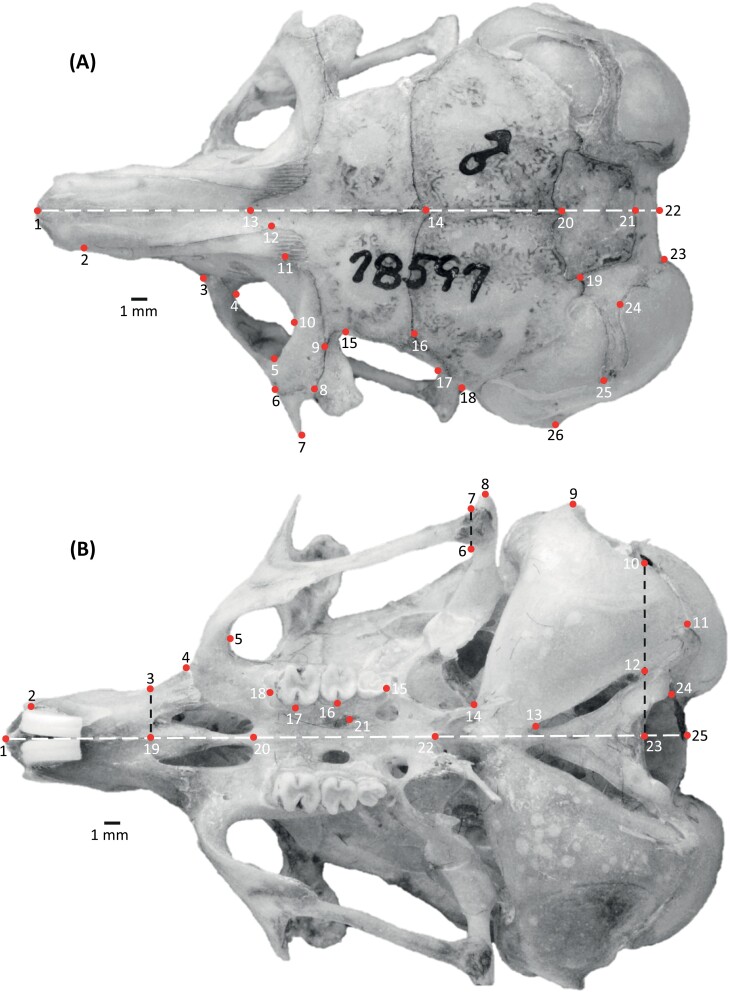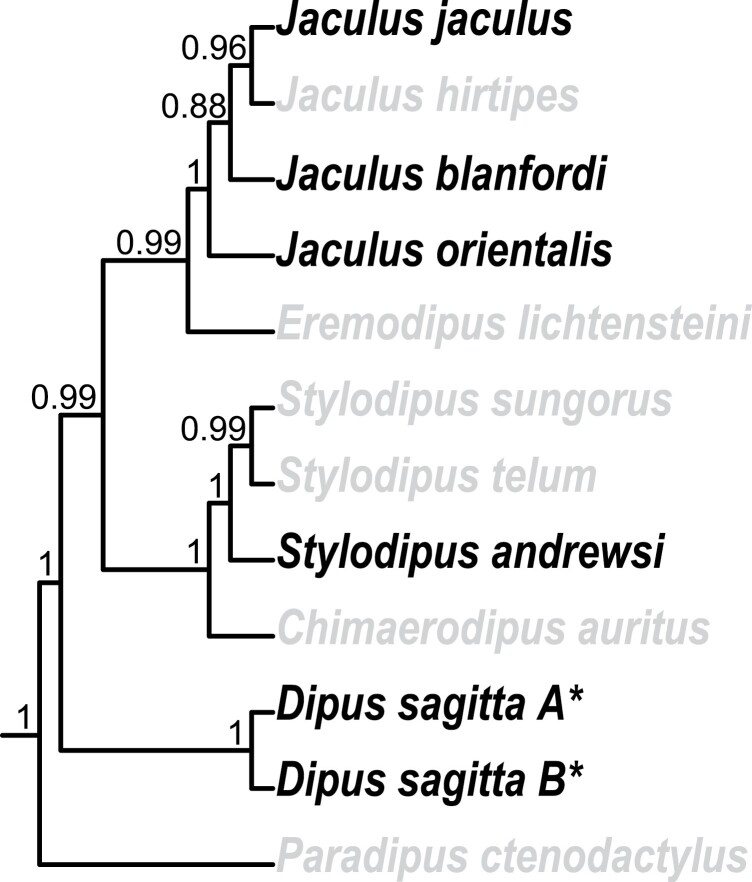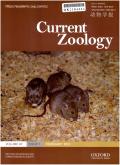Cranial differences in three-toed jerboas (Dipodinae, Dipodidae, Rodentia) according to recent taxonomic revisions.
IF 2
2区 生物学
Q2 ZOOLOGY
引用次数: 2
Abstract
Abstract Recent phylogenetic studies amended the taxonomy of three-toed jerboas (subfamily Dipodinae), including raising subspecies to full species. Here, we use geometric morphometrics to compare scaled-shape differences in dipodine crania while considering their revised taxonomy. We sampled Dipus deasyi, D. sagitta halli, D. s. sowerbyi, Jaculus blanfordi blanfordi, J. hirtipes, J. jaculus, J. loftusi, J. orientalis gerboa, J. o. mauritanicus, and Stylodipus andrewsi. Crania were not sexually dimorphic. Common allometry explained some of the shape variation, for example, reduced braincases in larger specimens. Most operational taxonomic unit pairs differed in both size and shape. Dipus and Stylodipus clustered together based on their cranial shape. Jaculus differed from the aforementioned genera by its larger tympanic bulla, broader braincase, larger infraorbital foramen, along with reduced molars and rostra. Jaculus orientalis differed from other Jaculus by its broader face versus reduced cranial vault. Jaculus blanfordi (subgenus Haltomys) resembles members of the subgenus Jaculus more than its consubgener (J. orientalis). Jaculus loftusi, previously considered a synonym of J. jaculus, clearly differed from the latter by its shorter rostrum, smaller infraorbital foramen, and more caudolaterally expanded tympanic bulla. Jaculus hirtipes, another recent synonym of J. jaculus, resembled J. blanfordi more in scaled cranial shape than it did J. jaculus. Dipus sagitta halli and D. s. sowerbyi were indistinguishable, but they clearly differed from D. deasyi (recently raised to full species) with the latter having a larger molar row, more inflated tympanic bulla, and shorter, slenderer rostrum. Ecological explanations for detected cranial shape differences are considered, including diet and habitat (particularly substrate).



三趾跳鼠(足足科,足足科,啮齿目)颅骨差异的最新分类修订。
最近的系统发育研究修正了三趾跳鼠(足趾亚科)的分类,包括将亚种提高到全种。在这里,我们使用几何形态计量学来比较双波丁颅骨的尺度形状差异,同时考虑他们的修订分类。我们采集的样本有:长尾猕猴桃、矢状树梢猕猴桃、苏氏猕猴桃、布氏猕猴桃、毛氏猕猴桃、东方猕猴桃、毛氏猕猴桃和andrewstylodipus。颅骨不是两性二形的。常见的异速测量解释了一些形状变化,例如,在较大的标本中减少了脑块。大多数可操作的分类学单位对在大小和形状上都不同。Dipus和Stylodipus根据它们的颅骨形状聚在一起。Jaculus与上述属的不同之处在于其鼓室大,颅脑宽,眶下孔大,磨牙和喙变小。东方Jaculus orientalis与其他Jaculus的区别在于其较宽的脸和较小的颅穹窿。布兰福迪Jaculus blanfordi (Haltomys亚属)与Jaculus亚属的成员比其同属(J. orientalis)更相似。Jaculus loftusi,以前被认为是jj . Jaculus的同义词,与jj . Jaculus明显不同,它的喙部较短,眶下孔较小,鼓室球更向尾侧扩张。小枝小枝(Jaculus hirtipes)是小枝小枝的另一个近代性同义植物,其鳞片状的颅骨形状与布兰福德小枝小枝更相似。Dipus sagitta halli和d.s. sowerbyi无法区分,但它们明显不同于d.s deasyi(最近培育为完整种),后者具有较大的臼齿排,更膨大的鼓室球和更短、更细的喙。考虑了对检测到的颅骨形状差异的生态学解释,包括饮食和栖息地(特别是基质)。
本文章由计算机程序翻译,如有差异,请以英文原文为准。
求助全文
约1分钟内获得全文
求助全文
来源期刊

Current Zoology
Agricultural and Biological Sciences-Animal Science and Zoology
CiteScore
3.20
自引率
9.10%
发文量
111
审稿时长
6 weeks
期刊介绍:
About the Journal
Current Zoology (formerly Acta Zoologica Sinica, founded in 1935) is an open access, bimonthly, peer-reviewed international journal of zoology. It publishes review articles and research papers in the fields of ecology, evolution and behaviour.
Current Zoology is sponsored by Institute of Zoology, Chinese Academy of Sciences, along with the China Zoological Society.
 求助内容:
求助内容: 应助结果提醒方式:
应助结果提醒方式:


